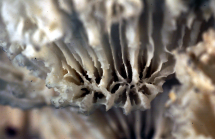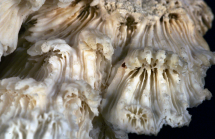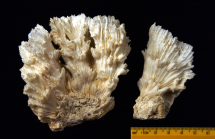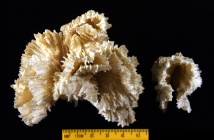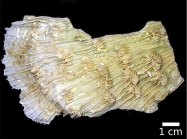
Chinese
Register of
Marine Species
(ChaRMS)
Register of
Marine Species
(ChaRMS)
| Intro | | Search taxa | | Taxon tree | | Sources | | Statistics | | Editors | | Log in |
Scleractinia taxon detailsMycedium elephantotus (Pallas, 1766)
207373 (urn:lsid:marinespecies.org:taxname:207373)
accepted
Species
Agaricia elephantotus (Pallas, 1766) · unaccepted > superseded combination
Madrepora elephantotus Pallas, 1766 · unaccepted > superseded combination (basionym)
Mycedium elephantotus var. dentatum Chevalier, 1975 · unaccepted > junior subjective synonym
Mycedium elephantotus var. okeni Milne Edwards & Haime, 1851 · unaccepted > junior subjective synonym
Mycedium elephantotus var. pachycostatum Chevalier, 1975 · unaccepted > junior subjective synonym
Mycedium elephantotus var. tenuicostatum Verrill, 1901 · unaccepted > junior subjective synonym
Mycedium elephantotus var. tubifex (Dana, 1846) · unaccepted > junior subjective synonym
Mycedium explanatum (Verrill, 1864) · unaccepted > junior subjective synonym
Mycedium explanatum var. turgida Verrill, 1901 · unaccepted > junior subjective synonym
Mycedium okeni Milne Edwards & Haime, 1851 · unaccepted > junior subjective synonym
Mycedium tenuicostatum Verrill, 1901 · unaccepted > junior subjective synonym
Mycedium tubifex (Dana, 1846) · unaccepted > junior subjective synonym
Mycedium tubifex var. bifrons Umbgrove, 1939 · unaccepted > junior subjective synonym
Pavonia elephantotus (Pallas, 1766) · unaccepted > superseded combination
Phyllastraea explanata Verrill, 1864 · unaccepted > junior subjective synonym
Phyllastraea okeni (Milne Edwards & Haime, 1851) · unaccepted > junior subjective synonym
Phyllastraea tubifex Dana, 1846 · unaccepted > junior subjective synonym
marine,
(of Madrepora elephantotus Pallas, 1766) Pallas, P. S. (1766). Elenchus zoophytorum sistens generum adumbrationes generaliores et specierum cognitarum succintas descriptiones, cum selectis auctorum synonymis. [List of zoophytes containing general outlines of genera and brief descriptions of known species, with selected synonyms of the authors.]. <em>Fransiscum Varrentrapp, Hagae.</em> 451 pp., available online at https://www.biodiversitylibrary.org/page/6019361 [details]
Neotype (of Madrepora elephantotus Pallas, 1766)...
Neotype (of Madrepora elephantotus Pallas, 1766) ZRC.CNI.0916, verbatimGeounit Raffles Light, Singa... [details]
Description Colonies occur in particularly attractive shades of green and purple, showing strongly iridescent colours. Usually the...
Description Colonies occur in particularly attractive shades of green and purple, showing strongly iridescent colours. Usually the centres of calices have a different colour to the greener inter-corallite tissue. The corallites always incline outward, towards the edges of the leaves. Undersides are not spiny. Septo-costae are commonly without spines. Young colonies show a central, large calice and rudimentary peripheral ones and may be confused with Echinopora echinata. This species is found over a broad range of depths on fore- and back reef slopes. It also tolerates well the more sedimented lagoonal habitats where it can resist sedimentation, partly due to a tendency always to grow on vertical faces in such habitats. It may form colonies up to a metre across in sheltered areas, though colonies are usually smaller on fore-reef slopes. (Sheppard, 1998 <308>) Colonies are laminar or foliaceous. Corallites are nose-shaped, facing outward towards the corallum perimeter. Septa and columellae are well developed and costae form outwardly radiating ribs on the corallum surface which may become highly elaborated on corallite walls. The coenosteum is never pitted at the insertion of new septo-costae. Polyps are extended only at night. Colour: usually a uniform brown, grey, green or pink but may have green or red oral discs and may have a coloured margin around the colony. Abundance: common over a wide range of habitats. (Veron, 1986 <57>) Similar in colour and growth to Oxypora and Echinophyllia, but corallites clearly face towards the perimeter of the plates. Colonies may be foliaceous. Septo-costae are again evident as striations radiating to the perimeter of the colony. Habitat: diverse reef areas. (Richmond, 1997) [details]
Hoeksema, B. W.; Cairns, S. (2025). World List of Scleractinia. Mycedium elephantotus (Pallas, 1766). Accessed at: https://www.marinespecies.org/Scleractinia/aphia.php?p=taxdetails&id=207373 on 2025-06-05
Date action by
original description
(of Mycedium tenuicostatum Verrill, 1901) Verrill A. E. (1901). Variations and nomenclature of Bermudian, West Indian and Brazilian reef corals, with notes on various Indo-Pacific corals. <em>Transactions of the Connecticut Academy of Arts and Sciences.</em> 11: 63-168., available online at https://www.biodiversitylibrary.org/page/13464046 [details]
original description (of Madrepora elephantotus Pallas, 1766) Pallas, P. S. (1766). Elenchus zoophytorum sistens generum adumbrationes generaliores et specierum cognitarum succintas descriptiones, cum selectis auctorum synonymis. [List of zoophytes containing general outlines of genera and brief descriptions of known species, with selected synonyms of the authors.]. <em>Fransiscum Varrentrapp, Hagae.</em> 451 pp., available online at https://www.biodiversitylibrary.org/page/6019361 [details] original description (of Phyllastraea tubifex Dana, 1846) Dana, J.D. (1846-1849). Zoophytes. United States Exploring Expedition during the years 1838-1842. <em>Lea and Blanchard, Philadelphia.</em> 7: 1-740, 61 pls. (1846: 1-120, 709-720; 1848: 121-708, 721-740; 1849: atlas pls. 1-61)., available online at https://www.biodiversitylibrary.org/page/18989497, http://www.sil.si.edu/digitalcollections/usexex/navigation/ScientificText/USExEx19_08select.cfm [details] original description (of Mycedium okeni Milne Edwards & Haime, 1851) Milne Edwards H, Haime J. (1851). Recherches sur les polypiers. Mémoire 6. Monographie des Fongides. <em>Annales des Sciences Naturelles, Zoologie, Series 3.</em> 15: 73-144. [details] original description (of Phyllastraea explanata Verrill, 1864) Verrill, A. E. (1864). List of the polyps and corals sent by the Museum of Comparative Zoology to other institutions in exchange, with annotations. <em>Bulletin of the Museum of Comparative Zoology.</em> 1: 29-60., available online at https://www.biodiversitylibrary.org/page/6587563 [details] original description (of Mycedium elephantotus var. pachycostatum Chevalier, 1975) Chevalier JP. (1975). Les Scléractiniaires de la Mélanésie Française (Nouvelle-Caledonie, Iles Chesterfield, Iles Loyauté, Nouvelles Hébrides). II. Expedition Française sur les Récifs Coralliens Nouv.-Calédonie. 7: 1-407, pls. 1-42. Paris. [details] original description (of Mycedium elephantotus var. dentatum Chevalier, 1975) Chevalier JP. (1975). Les Scléractiniaires de la Mélanésie Française (Nouvelle-Caledonie, Iles Chesterfield, Iles Loyauté, Nouvelles Hébrides). II. Expedition Française sur les Récifs Coralliens Nouv.-Calédonie. 7: 1-407, pls. 1-42. Paris. [details] original description (of Mycedium tubifex var. bifrons Umbgrove, 1939) Umbgrove JHF. (1939). Madreporaria from the Bay of Batavia. <em>Zoologische Mededelingen, Leiden.</em> 22: 1-64. [details] original description (of Mycedium explanatum var. turgida Verrill, 1901) Verrill A. E. (1901). Variations and nomenclature of Bermudian, West Indian and Brazilian reef corals, with notes on various Indo-Pacific corals. <em>Transactions of the Connecticut Academy of Arts and Sciences.</em> 11: 63-168., available online at https://www.biodiversitylibrary.org/page/13464046 page(s): 137 [details] context source (Hexacorallia) Fautin, Daphne G. (2013). Hexacorallians of the World. (look up in IMIS) [details] basis of record Veron JEN. (1986). Corals of Australia and the Indo-Pacific. <em>Angus & Robertson Publishers.</em> [details] additional source Sheppard CRC. (1987). Coral species of the Indian Ocean and adjacent seas: a synonymised compilation and some regional distribution patterns. <em>Atoll Research Bulletin.</em> 307: 1-32., available online at http:// https://doi.org/10.5479/si.00775630.307.1 [details] additional source Cairns, S.D., B.W. Hoeksema & J. van der Land. (1999). Appendix: List of extant stony corals. <em>Atoll Research Bulletin.</em> 459: 13-46. page(s): 36 [details] additional source Volpi, C., Benvenuti D., 2003. The Duchassaing & Michelotti collection of Caribbean corals: status of the types and location of the specimens. Atti della Societa Italiana di Scienze Naturali e del Museo Civico di Storia Naturale in Milano 144 1: 51-74. page(s): 63 [details] additional source Randall RH. (2003). An annotated checklist of hydrozoan and scleractinian corals collected from Guam and other Mariana Islands. <em>Micronesica.</em> 35-36: 121-137. page(s): 134 [details] additional source Oken, L. (1815-1816). Lehrbuch der Naturgeschichte. Dritter Theil: Zoologie. <em>Erste Abtheilung: Fleischlose Thiere,Leipzig: C.H. Reclam & Jena: A. Schmid, [book (3rd vol part one, of 3 vols, including plates atlas of T.1, 1813].</em> xxviii + 842 pp. + xviii, 40 pls. L [copepods 180-184, 357-359, 4 plates]., available online at https://doi.org/10.5962/bhl.title.166403 [details] additional source Cairns, S.D., B.W. Hoeksema & J. van der Land. (2007). as a contribution to UNESCO-IOC Register of Marine Organisms. (look up in IMIS) [details] additional source Liu, J.Y. [Ruiyu] (ed.). (2008). Checklist of marine biota of China seas. <em>China Science Press.</em> 1267 pp. (look up in IMIS) [details] Available for editors additional source Veron JEN, Pichon M. (1980). Scleractinia of Eastern Australia – Part III. Family Agariciidae, Siderastreidae, Fungiidae, Oculinidae, Merulinidae, Mussidae, Pectinidae, Caryophyllidae, Dendrophylliidae. <em>Australian Institute of Marine Science Monograph Series.</em> 4: 1-459. [details] additional source Veron JEN. (2000). Corals of the World. Vol. 1–3. <em>Australian Institute of Marine Science and CRR, Queensland, Australia.</em> [details] additional source Wells JW. (1955). Recent and subfossil corals of Moreton Bay, Queensland. <em>Queensland. University of Queensland Papers, Department of Geology.</em> 4 (10): 1-18, pls. 1-3. page(s): 16 [details] additional source Wells JW. (1961). Notes on Indo-Pacific scleractinian corals. Part 3, A new reef coral from New Caledonia. <em>Pacific Science.</em> 15: 189-191. page(s): 189 [details] additional source Umbgrove JHF. (1940). Madreporaria from the Togian Reefs (Gulf of Tomini, North-Celebes. <em>Zoologische Mededelingen, Leiden.</em> 22: 265-310. page(s): 269, 271, 290, 309, Pl. XXVIII [details] additional source Yabe H, Sugiyama T, Eguchi M. (1936). Recent reef-building corals from Japan and the South Sea Islands under the Japanese mandate. I. <em>The Science reports of the Tôhoku Imperial University, Sendai, 2nd Series (Geologie).</em> Special Volume 1: 1-66, pls. 1-59. page(s): 4, 49, Pl. XXXIII, Pl. XXXVII [details] additional source Chevalier JP. (1975). Les Scléractiniaires de la Mélanésie Française (Nouvelle-Caledonie, Iles Chesterfield, Iles Loyauté, Nouvelles Hébrides). II. Expedition Française sur les Récifs Coralliens Nouv.-Calédonie. 7: 1-407, pls. 1-42. Paris. [details] additional source Nemenzo F (1959) Systematic studies on Philippine shallow water scleractinians: II. Suborder Faviida. Natural and Applied Science Bulletin, University of the Philippines 16: 73-135, pls. 1-24. page(s): 76, 120 [details] additional source Pichon, M.; Benzoni, F. (2007). Taxonomic re-appraisal of zooxanthellate Scleractinian Corals in the Maldive Archipelago. <em>Zootaxa.</em> 1441: 21–33. page(s): 33 [details] additional source Huang D, Benzoni F, Fukami H, Knowlton N, Smith ND, Budd AF (2014) Taxonomic classification of the reef coral families Merulinidae, Montastraeidae, and Diploastraeidae (Cnidaria: Anthozoa: Scleractinia). Zoological Journal of the Linnean Society 171: 277–355., available online at https://doi.org/10.1111/zoj.12140 [details] additional source Verrill A. E. (1901). Variations and nomenclature of Bermudian, West Indian and Brazilian reef corals, with notes on various Indo-Pacific corals. <em>Transactions of the Connecticut Academy of Arts and Sciences.</em> 11: 63-168., available online at https://www.biodiversitylibrary.org/page/13464046 page(s): 133-135 [details] additional source Veron JEN, Marsh LM. (1988). Hermatypic corals of Western Australia : records and annotated species list. <em>Records Western Australian Museum Supplement.</em> 29: 1-136., available online at https://doi.org/10.5962/bhl.title.60555 page(s): 32, 89 [details] additional source Duchassaing P, Michelotti J. (1864). Supplément au mémoire sur les coralliaires des Antilles. <em>Memorie della Reale Accademia della Scienze di Torino, Serie 2.</em> 23: 97-206, plates 1-11., available online at https://www.biodiversitylibrary.org/page/31197612 [details] additional source Milne Edwards H, Haime J. (1851). Recherches sur les polypiers. Mémoire 6. Monographie des Fongides. <em>Annales des Sciences Naturelles, Zoologie, Series 3.</em> 15: 73-144. page(s): 73, 131-132 [details] additional source Randall RH, Myers RF. (1983). The corals. Guide to the Coastal Resources of Guam: Vol. 2. <em>University of Guam Press, Guam, pp. 128.</em> [details] additional source Veron, J. E. N. (2000). Corals of the World, Volume II: Families Astrocoeniidae, Pocilloporidae, Euphyllidae, Oculinidae, Meandrinidae, Siderastreidae, Agariciidae, Fungiidae, Rhizangiidae, Pectiniidae, Merulinidae, Dendrophylliidae, Caryophylliidae. Australian Institute of Marine Science. Townsville., volume 2, pp. 429. page(s): 344-345 [details] additional source Zlatarski, V. N.; Estalella, N. M. (1980). Scleractinia of Cuba with data on the constituent organisms [in Bulgarian]. Bulgarian Academy of Science. Sophia., pp. 312. page(s): 167, 301, 306 [details] additional source Wells JW. (1954). Recent corals of the Marshall Islands: Bikini and nearby atolls, part 2, oceanography (biologic). <em>U.S. Geological Survey Professional Paper.</em> 260(I): 385-486. page(s): 394 [details] additional source Pillai CSG. (1983). Structure and generic diversity of recent Scleractinia of India. <em>Journal of the Marine Biological Association of India.</em> 25, 1-2, 78-90. page(s): 88 [details] additional source Veron, J. E. N.; Pichon, M. (1979). Scleractinia of Eastern Australia, part III: Families Agariciidae, Siderastreidae, Fungiidae, Oculinidae, Merulinidae, Mussidae, Pectiniidae, Caryophylliidae, Dendrophylliidae. Australian Government Publishing Service. Canberra., volume 4, pp. 422. page(s): 7, 320, 319-325 [details] additional source Sheppard, C. R. C. (1985). Fringing reefs in the southern region, Jeddah to Jizan. Fauna of Saudi Arabia, 7, 37-58 page(s): 46 [details] additional source Kühlmann, D. H. H. (2006). Die Steinkorallensammlung im Naturhistorischen Museum in Rudolstadt (Thüringen) nebst ökologischen Bemerkungen. Rudolstädter Naturhistorische Schriften, 13, 37-113 page(s): 63, 100, 111 [details] additional source Wallace, C. C.; Fellegara, I.; Muir, P. R.; Harrison, P. L. (2009). The scleractinian corals of Moreton Bay, eastern Australia: high latitude, marginal assemblages with increasing species richness. Memoirs of the Queensland Museum, 54, 2 page(s): 9, 98 [details] additional source Reinicke, G. B. (1997). Different modes of adaptation to light conditions in Red Sea Xeniidae reflected by their depth distribution patterns (Octocorallia, Alcyonacea). Proceedings of the Sixth International Conference on Coelenterate Biology, 393-402 page(s): 400 [details]  Present Present  Inaccurate Inaccurate  Introduced: alien Introduced: alien  Containing type locality Containing type locality
Neotype (of Madrepora elephantotus Pallas, 1766) ZRC.CNI.0916, verbatimGeounit Raffles Light, Singa... [details]
Nontype (of Phyllastraea okeni (Milne Edwards & Haime, 1851)) BMNH, geounit Taiwanese Exclusive Economic Zone [details]
Nontype (of Mycedium tenuicostatum Verrill, 1901) FMNH, geounit Singaporean Exclusive Economic Zone [details]
Nontype (of Mycedium tenuicostatum Verrill, 1901) IGPS 56626, geounit Palau Exclusive Economic Zone [details]
Nontype (of Mycedium tenuicostatum Verrill, 1901) YPM, geounit Singaporean Exclusive Economic Zone [details]
Nontype (of Mycedium tubifex (Dana, 1846)) HLD X2: 127-57, geounit Indian Exclusive Economic Zone [details]
Nontype (of Mycedium tubifex (Dana, 1846)) HLD X2: 165-1, geounit Indian Exclusive Economic Zone [details]
Nontype (of Mycedium tubifex (Dana, 1846)) IGPS 56625, geounit Palau Exclusive Economic Zone [details]
Nontype (of Mycedium tubifex (Dana, 1846)) IGPS 57421, geounit Palau Exclusive Economic Zone [details]
Nontype (of Mycedium tubifex (Dana, 1846)) ZMH, geounit Palau Exclusive Economic Zone [details]
Nontype (of Phyllastraea tubifex Dana, 1846) BMNH, geounit Taiwanese Exclusive Economic Zone [details]
Nontype IGPS 41953, geounit Palau Exclusive Economic Zone [details]
Nontype IGPS 57414, geounit Palau Exclusive Economic Zone [details]
Nontype IGPS 57420, geounit Palau Exclusive Economic Zone [details]
Nontype NMSR 8608, geounit Sudanese Exclusive Economic Zone [details]
Nontype WAM 319-77, geounit Australian Exclusive Economic Zone [details]
Nontype WAM 321-77, geounit Australian Exclusive Economic Zone [details]
Nontype WAM 401-77, geounit Australian Exclusive Economic Zone [details]
Nontype WAM 403-77, geounit Australian Exclusive Economic Zone [details]
Nontype WAM 430-77, geounit Australian Exclusive Economic Zone [details]
Nontype WAM 444-83, geounit Australian Exclusive Economic Zone [details]
Nontype WAM 473-81, geounit Australian Exclusive Economic Zone [details]
Nontype WAM 490-81, geounit Australian Exclusive Economic Zone [details]
Nontype WAM 505-80, geounit Australian Exclusive Economic Zone [details]
Nontype WAM 506-80, geounit Australian Exclusive Economic Zone [details]
Nontype WAM 507-80, geounit Australian Exclusive Economic Zone [details]
Nontype WAM 574-78, geounit Australian Exclusive Economic Zone [details]
Nontype WAM 575-78, geounit Australian Exclusive Economic Zone [details]
Nontype WAM 580-78, geounit Australian Exclusive Economic Zone [details]
Nontype WAM 582-78, geounit Australian Exclusive Economic Zone [details]
Syntype (of Phyllastraea tubifex Dana, 1846) USNM 51 [details]
Unknown type (of Mycedium okeni Milne Edwards & Haime, 1851) IMC mrt-95, geounit Myanmar Exclusive Economic Zone [details]
Unknown type (of Mycedium okeni Milne Edwards & Haime, 1851) IMC, geounit Myanmar Exclusive Economic Zone [details]
Unknown type MZUF 610, geounit Jamaican Exclusive Economic Zone [details]
Unknown type MZUF 611, geounit Jamaican Exclusive Economic Zone [details]
From editor or global species database
Biology zooxanthellate [details]Unreviewed
Description Colonies occur in particularly attractive shades of green and purple, showing strongly iridescent colours. Usually the centres of calices have a different colour to the greener inter-corallite tissue. The corallites always incline outward, towards the edges of the leaves. Undersides are not spiny. Septo-costae are commonly without spines. Young colonies show a central, large calice and rudimentary peripheral ones and may be confused with Echinopora echinata. This species is found over a broad range of depths on fore- and back reef slopes. It also tolerates well the more sedimented lagoonal habitats where it can resist sedimentation, partly due to a tendency always to grow on vertical faces in such habitats. It may form colonies up to a metre across in sheltered areas, though colonies are usually smaller on fore-reef slopes. (Sheppard, 1998 <308>)Colonies are laminar or foliaceous. Corallites are nose-shaped, facing outward towards the corallum perimeter. Septa and columellae are well developed and costae form outwardly radiating ribs on the corallum surface which may become highly elaborated on corallite walls. The coenosteum is never pitted at the insertion of new septo-costae. Polyps are extended only at night. Colour: usually a uniform brown, grey, green or pink but may have green or red oral discs and may have a coloured margin around the colony. Abundance: common over a wide range of habitats. (Veron, 1986 <57>) Similar in colour and growth to Oxypora and Echinophyllia, but corallites clearly face towards the perimeter of the plates. Colonies may be foliaceous. Septo-costae are again evident as striations radiating to the perimeter of the colony. Habitat: diverse reef areas. (Richmond, 1997) [details] Spelling Spelled M. elephantotum in Best et al. (1980) . Type locality: "Indian Ocean" (Veron, 1986). [details]
To Barcode of Life (5 barcodes)
To Biodiversity Heritage Library (10 publications) (from synonym Phyllastraea tubifex Dana, 1846) To Biodiversity Heritage Library (24 publications) To Biodiversity Heritage Library (5 publications) (from synonym Mycedium tenuicostatum Verrill, 1901) To Biodiversity Heritage Library (9 publications) (from synonym Mycedium tubifex (Dana, 1846)) To Biological Information System for Marine Life (BISMaL) To European Nucleotide Archive, ENA (Mycedium elephantotus) To GenBank (20 nucleotides; 12 proteins) (from synonym Madrepora elephantotus Pallas, 1766) To GenBank (20 nucleotides; 12 proteins) To IUCN Red List (Least Concern) To USNM Invertebrate Zoology Cnidaria Collection (2 records) (from synonym Mycedium tenuicostatum Verrill, 1901) To USNM Invertebrate Zoology Cnidaria Collection (68 records) To USNM Invertebrate Zoology Cnidaria Collection (8 records) (from synonym Mycedium tubifex (Dana, 1846)) To ITIS |
